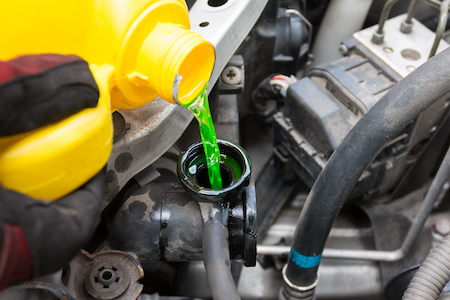Is your car in good shape?
If you’re like many people driving the streets of Denver, you might think: It’s fine.
Cars are tools we use to function in our daily lives. They bring us here and there, helping us check off boxes on our to-do lists from morning to night.
We don’t think much about them … until they don’t work. They make a noise, create an odor, or simply won’t go. Then we ask: Why?
Luckily, if you’re reading this, you might choose a proactive approach instead. For things like inspecting and changing coolant, that’s a good thing for your car.
Help, I think I have a coolant leak
Coolant – antifreeze – no matter how you say it, it’s an essential fluid your car can’t live without.
Megan discovered that early, and chose to do something about it. When she drove into our shop, she was proactive in her approach. “I found a light-green spot in my driveway this morning, and I knew it couldn’t be good.”
She’s right.
Let’s talk about coolant for a moment. Most people use the words coolant and antifreeze interchangeably, but in reality, they aren’t the same thing.
Antifreeze is a specific type of liquid used in a car’s cooling system. It is a mixture of water and chemicals, primarily ethylene glycol or propylene glycol. These chemicals lower the freezing point of the liquid, preventing it from turning into ice in cold temperatures.
The primary purpose of antifreeze is to protect the engine and cooling system from freezing in low temperatures, which could otherwise cause serious damage to the engine block, radiator, and other components.
Antifreeze is concentrated, meaning it must be diluted with water before use. Coolant is the product created once the two – antifreeze and water – are combined. You’ll find some coolants are made of a 70/30 split, while others move to a 50/50 ratio.
The role coolant plays in your vehicle
When that light green spot materialized on Megan’s driveway, it was a sure sign something was wrong.
Coolant has several important jobs to keep things running smoothly underneath the hood. Its primary function is handling the heat – you know, that scorching stuff generated by the engine during all that combustion magic. Coolant swoops in, soaks up that excess heat, and then gracefully whisks it away from crucial engine parts, preventing any meltdowns or engine damage.
In freezing cold weather, coolant throws on its “antifreeze” hat, ensuring the engine and the entire cooling system doesn’t turn into an ice sculpture. This protects the engine block, radiator, and other parts from cracking or getting damaged due to frost.
When things get toasty in the summertime, coolant’s got your back again. It raises the boiling point of the liquid, making sure it doesn’t start bubbling over and causing an engine meltdown in the heat.
With all of that action, there’s bound to be some grit and grime forming within. Coolant protects against corrosion, keeping the engine and the cooling system free from rust and scale. It’s like a shield against the forces of nature trying to wear down your car’s insides.
Lastly, coolant offers lubrication to the water pump, making sure it can keep that coolant circulating smoothly throughout the system. Plus, by keeping the engine at the perfect temperature, coolant helps your car operate efficiently, saving you on fuel and emissions.
That little leak Megan noticed is a sign something is off within the system.
What could possibly be wrong?
It’s easy to jump to conclusions. When you see a leak – green liquid on the ground – you assume it’s a problem. It’s not a clear indication of one problem; rather, it might be one of several.
Leaking Hose – Coolant hoses, which carry coolant between the engine, radiator, and other components, can deteriorate over time and develop cracks or leaks. A leaking hose is one of the most common causes of coolant puddles.
Radiator Leak – The radiator is a key component of the cooling system, and leaks can occur due to corrosion, physical damage, or age-related wear and tear.
Water Pump Issues – The water pump circulates coolant throughout the engine. A failing water pump can develop leaks and cause coolant to spill onto the ground.
Leaky Gasket – Coolant can also escape if there’s a gasket failure. For example, a damaged head gasket can allow coolant to mix with the engine oil, leading to more serious engine problems.
Overheating – If your engine overheats, the excess pressure can force coolant out of the system through any available opening. This could result in coolant ending up on the ground.
Loose or Damaged Reservoir Cap – Sometimes, a loose or damaged coolant reservoir cap can cause coolant to escape from the overflow tank, leading to a puddle beneath the car.
Internal Engine Issues – In some cases, internal engine problems, such as a cracked engine block or cylinder head, can lead to coolant mixing with the oil or leaking externally.
Inspecting and changing coolant is so much easier
Yes, coolant on your driveway can be a big problem. Think of it as a warning sign. When you see it, do as Megan did and bring your vehicle in as soon as you can.
Continuing to drive with a coolant leak can lead to engine damage and overheating, which can be costly to fix. Additionally, coolant is toxic to pets and wildlife, so it’s crucial to clean up any spills to prevent harm to animals in your area.
Keeping your car in great condition is a two-fold process. Megan has it right by paying attention to her vehicle. When noticing a change, bringing it in stops the problem as quickly as possible.
And when you do bring it in, bring it to someone you can trust. A partner that will give you honest feedback and reliable service.
It’s the best way to keep your vehicle reliable for the entire time you own it.

